Comprehensive Report on Leadership and Management in the NHS Context
VerifiedAdded on 2021/01/02
|11
|3186
|143
Report
AI Summary
This report offers a comprehensive analysis of leadership and management within the National Health Service (NHS). It begins by assessing key theoretical models and their applications, including system theory and democratic leadership styles, in the context of leadership, management, training, development, and talent management. The report identifies the roles and priorities of NHS management and HR functions, highlighting the importance of training and development. It also examines internal factors like staff shortages and talent management models (AARRR) and external factors such as technology and legal changes that influence these areas. Furthermore, the report addresses contemporary issues faced by line managers, such as the impact of Brexit and an aging population. It concludes with recommendations for improvement, aiming to enhance operational efficiency and productivity within the NHS.
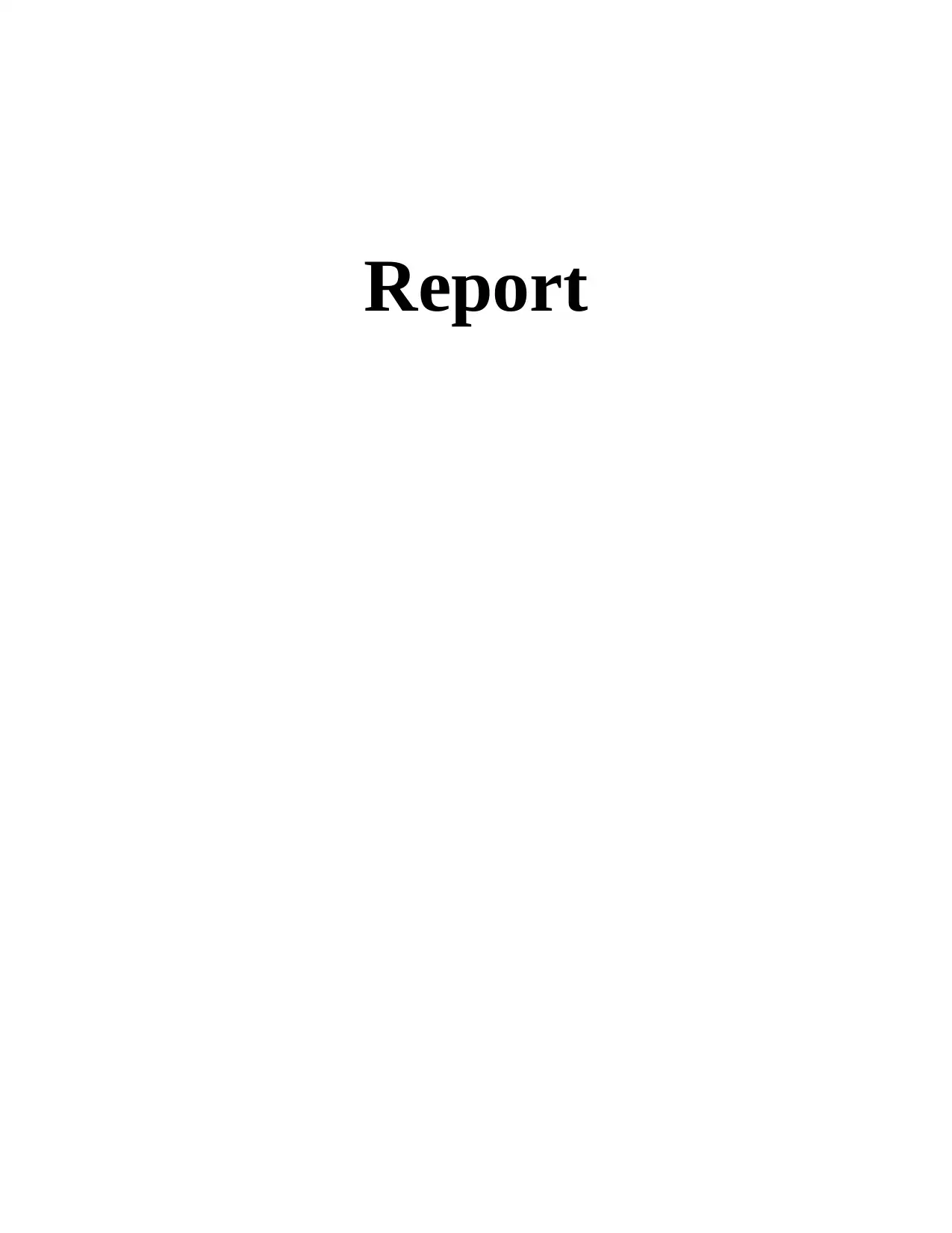
Report
Paraphrase This Document
Need a fresh take? Get an instant paraphrase of this document with our AI Paraphraser
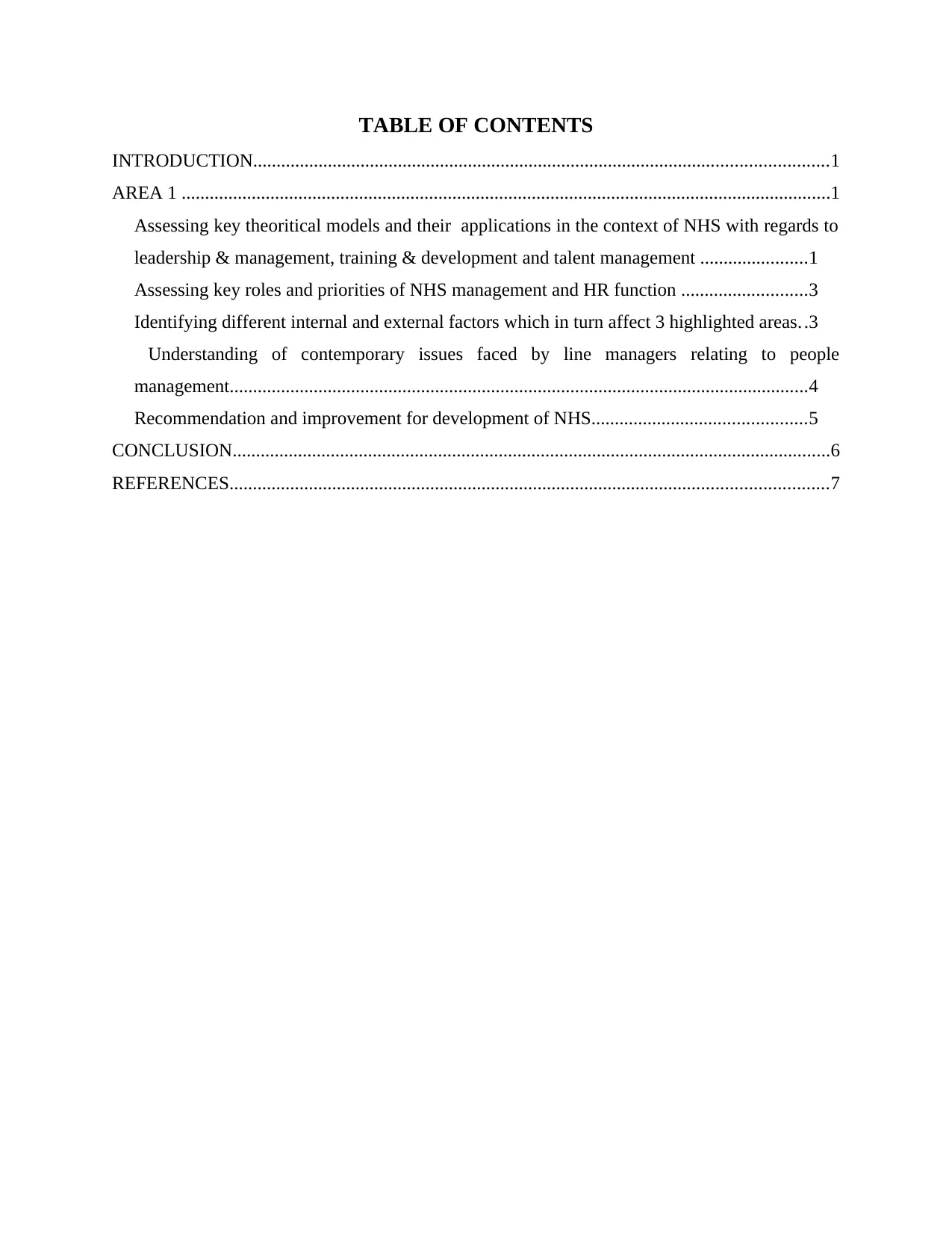
TABLE OF CONTENTS
INTRODUCTION...........................................................................................................................1
AREA 1 ...........................................................................................................................................1
Assessing key theoritical models and their applications in the context of NHS with regards to
leadership & management, training & development and talent management .......................1
Assessing key roles and priorities of NHS management and HR function ...........................3
Identifying different internal and external factors which in turn affect 3 highlighted areas..3
Understanding of contemporary issues faced by line managers relating to people
management............................................................................................................................4
Recommendation and improvement for development of NHS..............................................5
CONCLUSION................................................................................................................................6
REFERENCES................................................................................................................................7
INTRODUCTION...........................................................................................................................1
AREA 1 ...........................................................................................................................................1
Assessing key theoritical models and their applications in the context of NHS with regards to
leadership & management, training & development and talent management .......................1
Assessing key roles and priorities of NHS management and HR function ...........................3
Identifying different internal and external factors which in turn affect 3 highlighted areas..3
Understanding of contemporary issues faced by line managers relating to people
management............................................................................................................................4
Recommendation and improvement for development of NHS..............................................5
CONCLUSION................................................................................................................................6
REFERENCES................................................................................................................................7
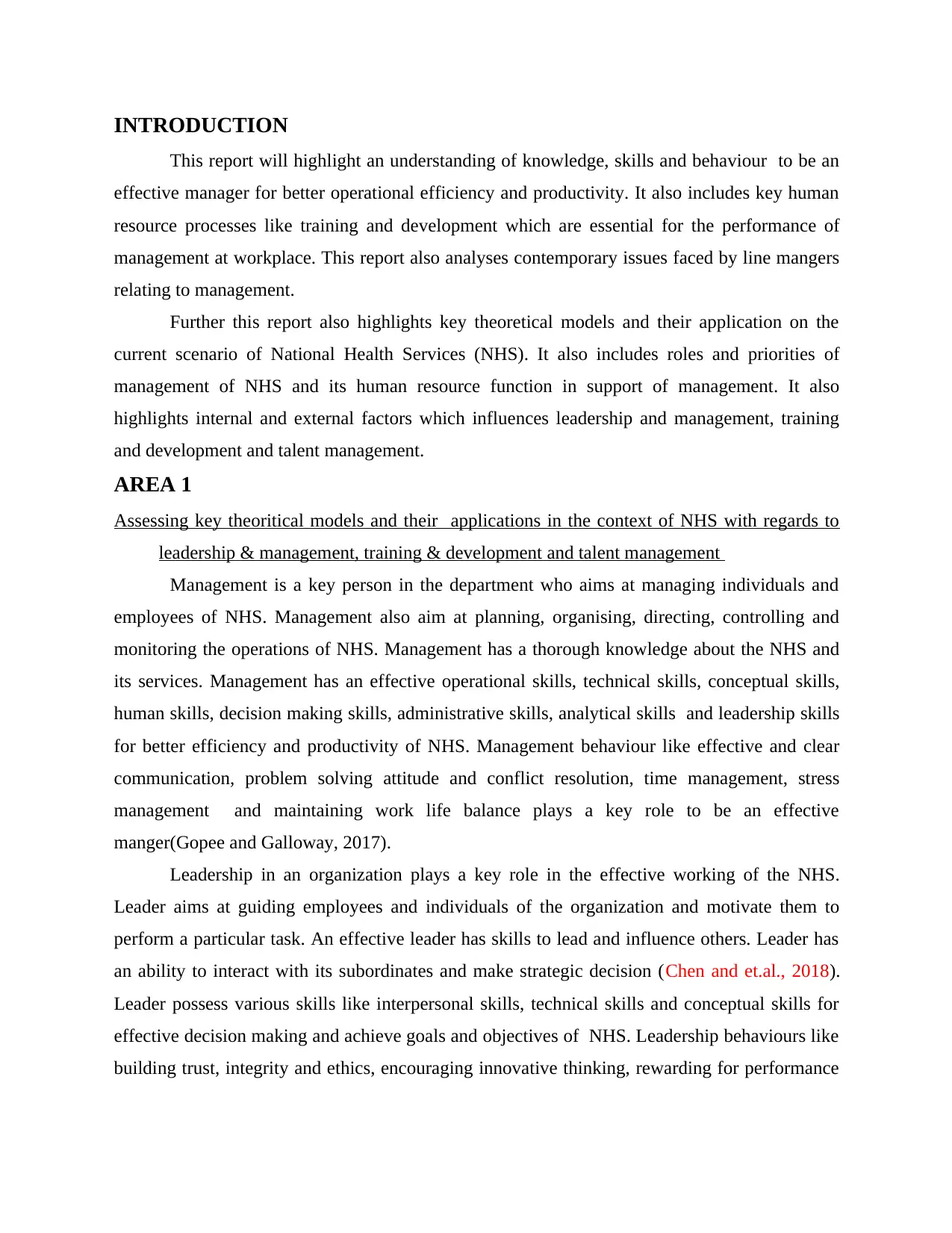
INTRODUCTION
This report will highlight an understanding of knowledge, skills and behaviour to be an
effective manager for better operational efficiency and productivity. It also includes key human
resource processes like training and development which are essential for the performance of
management at workplace. This report also analyses contemporary issues faced by line mangers
relating to management.
Further this report also highlights key theoretical models and their application on the
current scenario of National Health Services (NHS). It also includes roles and priorities of
management of NHS and its human resource function in support of management. It also
highlights internal and external factors which influences leadership and management, training
and development and talent management.
AREA 1
Assessing key theoritical models and their applications in the context of NHS with regards to
leadership & management, training & development and talent management
Management is a key person in the department who aims at managing individuals and
employees of NHS. Management also aim at planning, organising, directing, controlling and
monitoring the operations of NHS. Management has a thorough knowledge about the NHS and
its services. Management has an effective operational skills, technical skills, conceptual skills,
human skills, decision making skills, administrative skills, analytical skills and leadership skills
for better efficiency and productivity of NHS. Management behaviour like effective and clear
communication, problem solving attitude and conflict resolution, time management, stress
management and maintaining work life balance plays a key role to be an effective
manger(Gopee and Galloway, 2017).
Leadership in an organization plays a key role in the effective working of the NHS.
Leader aims at guiding employees and individuals of the organization and motivate them to
perform a particular task. An effective leader has skills to lead and influence others. Leader has
an ability to interact with its subordinates and make strategic decision (Chen and et.al., 2018).
Leader possess various skills like interpersonal skills, technical skills and conceptual skills for
effective decision making and achieve goals and objectives of NHS. Leadership behaviours like
building trust, integrity and ethics, encouraging innovative thinking, rewarding for performance
This report will highlight an understanding of knowledge, skills and behaviour to be an
effective manager for better operational efficiency and productivity. It also includes key human
resource processes like training and development which are essential for the performance of
management at workplace. This report also analyses contemporary issues faced by line mangers
relating to management.
Further this report also highlights key theoretical models and their application on the
current scenario of National Health Services (NHS). It also includes roles and priorities of
management of NHS and its human resource function in support of management. It also
highlights internal and external factors which influences leadership and management, training
and development and talent management.
AREA 1
Assessing key theoritical models and their applications in the context of NHS with regards to
leadership & management, training & development and talent management
Management is a key person in the department who aims at managing individuals and
employees of NHS. Management also aim at planning, organising, directing, controlling and
monitoring the operations of NHS. Management has a thorough knowledge about the NHS and
its services. Management has an effective operational skills, technical skills, conceptual skills,
human skills, decision making skills, administrative skills, analytical skills and leadership skills
for better efficiency and productivity of NHS. Management behaviour like effective and clear
communication, problem solving attitude and conflict resolution, time management, stress
management and maintaining work life balance plays a key role to be an effective
manger(Gopee and Galloway, 2017).
Leadership in an organization plays a key role in the effective working of the NHS.
Leader aims at guiding employees and individuals of the organization and motivate them to
perform a particular task. An effective leader has skills to lead and influence others. Leader has
an ability to interact with its subordinates and make strategic decision (Chen and et.al., 2018).
Leader possess various skills like interpersonal skills, technical skills and conceptual skills for
effective decision making and achieve goals and objectives of NHS. Leadership behaviours like
building trust, integrity and ethics, encouraging innovative thinking, rewarding for performance
⊘ This is a preview!⊘
Do you want full access?
Subscribe today to unlock all pages.

Trusted by 1+ million students worldwide
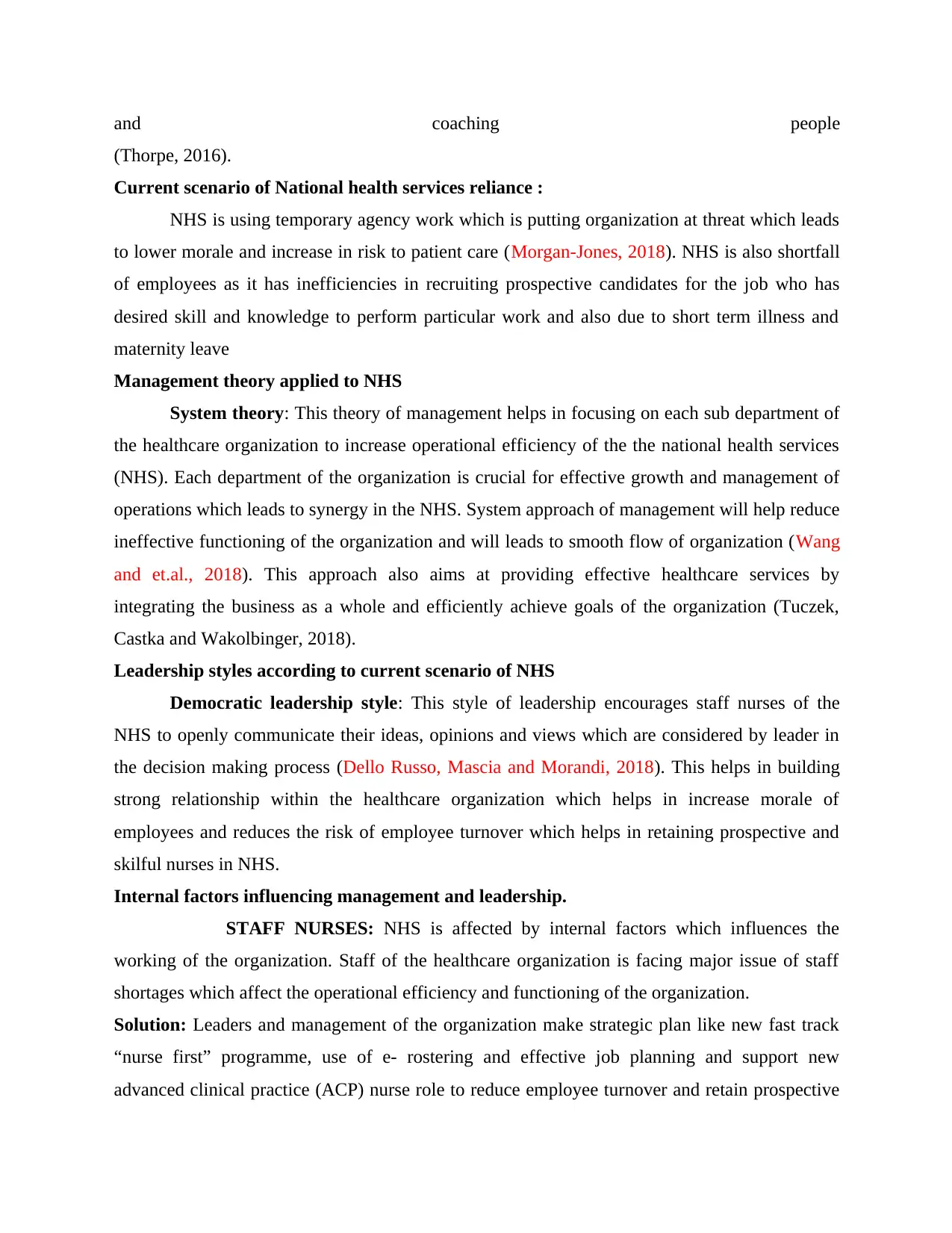
and coaching people
(Thorpe, 2016).
Current scenario of National health services reliance :
NHS is using temporary agency work which is putting organization at threat which leads
to lower morale and increase in risk to patient care (Morgan-Jones, 2018). NHS is also shortfall
of employees as it has inefficiencies in recruiting prospective candidates for the job who has
desired skill and knowledge to perform particular work and also due to short term illness and
maternity leave
Management theory applied to NHS
System theory: This theory of management helps in focusing on each sub department of
the healthcare organization to increase operational efficiency of the the national health services
(NHS). Each department of the organization is crucial for effective growth and management of
operations which leads to synergy in the NHS. System approach of management will help reduce
ineffective functioning of the organization and will leads to smooth flow of organization (Wang
and et.al., 2018). This approach also aims at providing effective healthcare services by
integrating the business as a whole and efficiently achieve goals of the organization (Tuczek,
Castka and Wakolbinger, 2018).
Leadership styles according to current scenario of NHS
Democratic leadership style: This style of leadership encourages staff nurses of the
NHS to openly communicate their ideas, opinions and views which are considered by leader in
the decision making process (Dello Russo, Mascia and Morandi, 2018). This helps in building
strong relationship within the healthcare organization which helps in increase morale of
employees and reduces the risk of employee turnover which helps in retaining prospective and
skilful nurses in NHS.
Internal factors influencing management and leadership.
STAFF NURSES: NHS is affected by internal factors which influences the
working of the organization. Staff of the healthcare organization is facing major issue of staff
shortages which affect the operational efficiency and functioning of the organization.
Solution: Leaders and management of the organization make strategic plan like new fast track
“nurse first” programme, use of e- rostering and effective job planning and support new
advanced clinical practice (ACP) nurse role to reduce employee turnover and retain prospective
(Thorpe, 2016).
Current scenario of National health services reliance :
NHS is using temporary agency work which is putting organization at threat which leads
to lower morale and increase in risk to patient care (Morgan-Jones, 2018). NHS is also shortfall
of employees as it has inefficiencies in recruiting prospective candidates for the job who has
desired skill and knowledge to perform particular work and also due to short term illness and
maternity leave
Management theory applied to NHS
System theory: This theory of management helps in focusing on each sub department of
the healthcare organization to increase operational efficiency of the the national health services
(NHS). Each department of the organization is crucial for effective growth and management of
operations which leads to synergy in the NHS. System approach of management will help reduce
ineffective functioning of the organization and will leads to smooth flow of organization (Wang
and et.al., 2018). This approach also aims at providing effective healthcare services by
integrating the business as a whole and efficiently achieve goals of the organization (Tuczek,
Castka and Wakolbinger, 2018).
Leadership styles according to current scenario of NHS
Democratic leadership style: This style of leadership encourages staff nurses of the
NHS to openly communicate their ideas, opinions and views which are considered by leader in
the decision making process (Dello Russo, Mascia and Morandi, 2018). This helps in building
strong relationship within the healthcare organization which helps in increase morale of
employees and reduces the risk of employee turnover which helps in retaining prospective and
skilful nurses in NHS.
Internal factors influencing management and leadership.
STAFF NURSES: NHS is affected by internal factors which influences the
working of the organization. Staff of the healthcare organization is facing major issue of staff
shortages which affect the operational efficiency and functioning of the organization.
Solution: Leaders and management of the organization make strategic plan like new fast track
“nurse first” programme, use of e- rostering and effective job planning and support new
advanced clinical practice (ACP) nurse role to reduce employee turnover and retain prospective
Paraphrase This Document
Need a fresh take? Get an instant paraphrase of this document with our AI Paraphraser
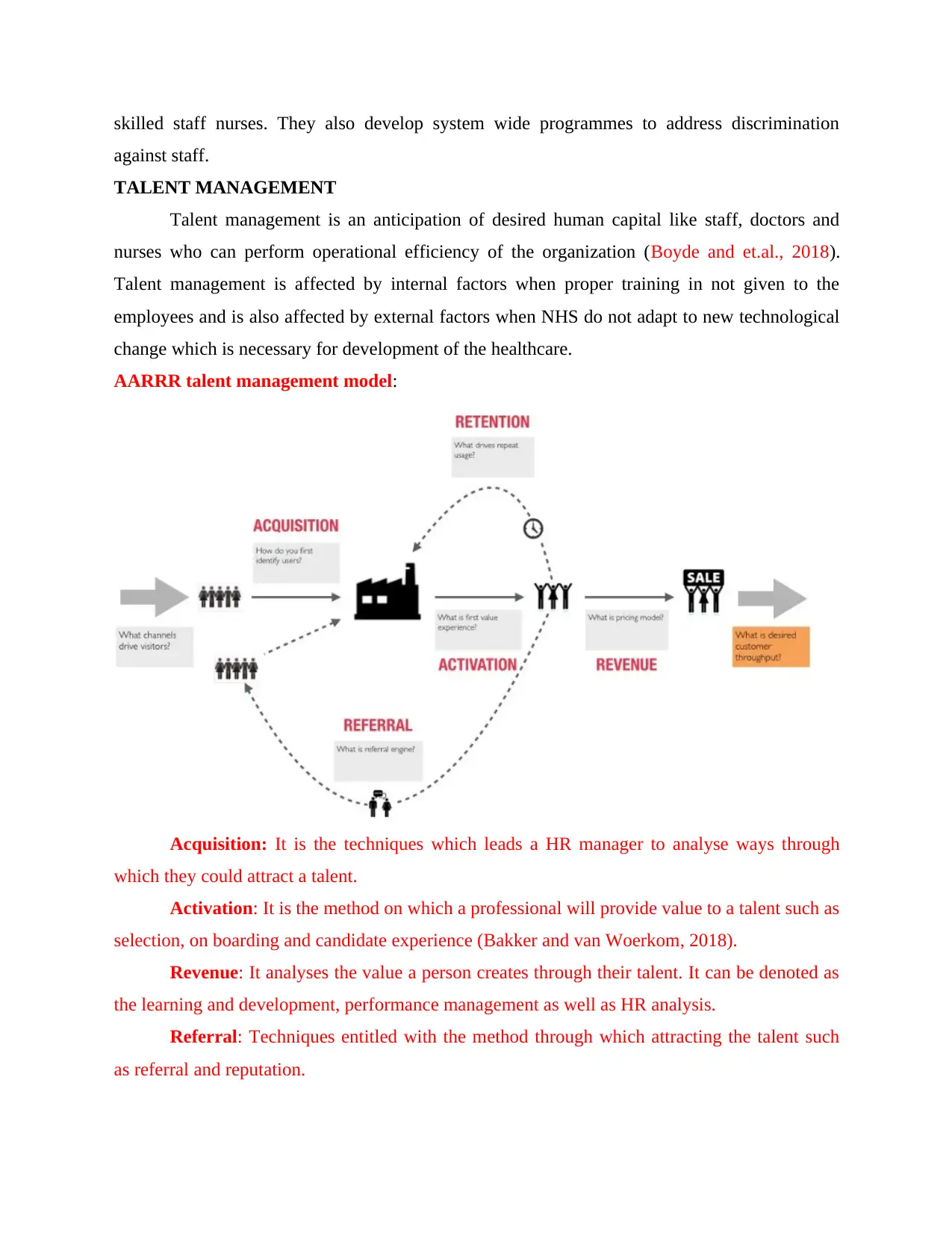
skilled staff nurses. They also develop system wide programmes to address discrimination
against staff.
TALENT MANAGEMENT
Talent management is an anticipation of desired human capital like staff, doctors and
nurses who can perform operational efficiency of the organization (Boyde and et.al., 2018).
Talent management is affected by internal factors when proper training in not given to the
employees and is also affected by external factors when NHS do not adapt to new technological
change which is necessary for development of the healthcare.
AARRR talent management model:
Acquisition: It is the techniques which leads a HR manager to analyse ways through
which they could attract a talent.
Activation: It is the method on which a professional will provide value to a talent such as
selection, on boarding and candidate experience (Bakker and van Woerkom, 2018).
Revenue: It analyses the value a person creates through their talent. It can be denoted as
the learning and development, performance management as well as HR analysis.
Referral: Techniques entitled with the method through which attracting the talent such
as referral and reputation.
against staff.
TALENT MANAGEMENT
Talent management is an anticipation of desired human capital like staff, doctors and
nurses who can perform operational efficiency of the organization (Boyde and et.al., 2018).
Talent management is affected by internal factors when proper training in not given to the
employees and is also affected by external factors when NHS do not adapt to new technological
change which is necessary for development of the healthcare.
AARRR talent management model:
Acquisition: It is the techniques which leads a HR manager to analyse ways through
which they could attract a talent.
Activation: It is the method on which a professional will provide value to a talent such as
selection, on boarding and candidate experience (Bakker and van Woerkom, 2018).
Revenue: It analyses the value a person creates through their talent. It can be denoted as
the learning and development, performance management as well as HR analysis.
Referral: Techniques entitled with the method through which attracting the talent such
as referral and reputation.
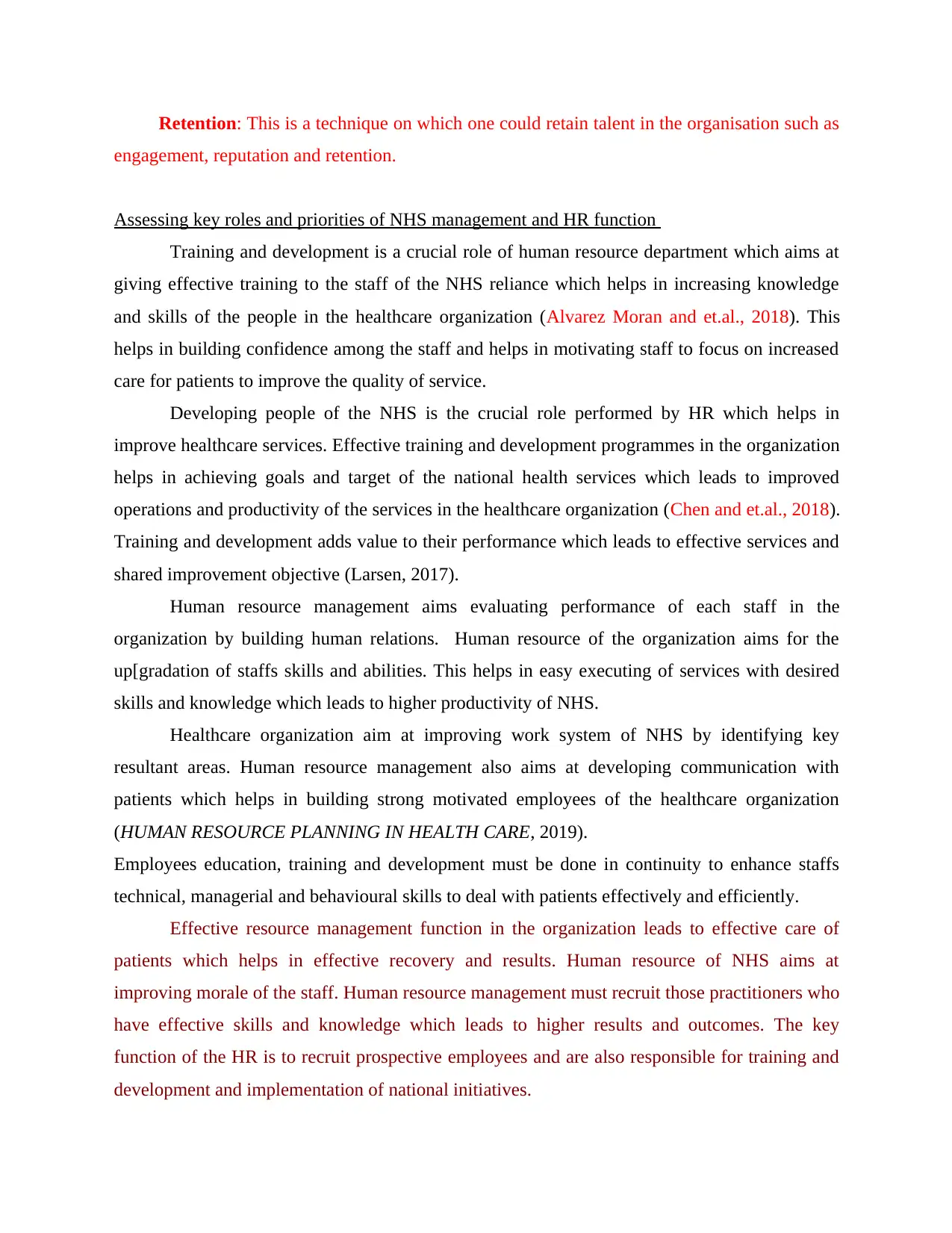
Retention: This is a technique on which one could retain talent in the organisation such as
engagement, reputation and retention.
Assessing key roles and priorities of NHS management and HR function
Training and development is a crucial role of human resource department which aims at
giving effective training to the staff of the NHS reliance which helps in increasing knowledge
and skills of the people in the healthcare organization (Alvarez Moran and et.al., 2018). This
helps in building confidence among the staff and helps in motivating staff to focus on increased
care for patients to improve the quality of service.
Developing people of the NHS is the crucial role performed by HR which helps in
improve healthcare services. Effective training and development programmes in the organization
helps in achieving goals and target of the national health services which leads to improved
operations and productivity of the services in the healthcare organization (Chen and et.al., 2018).
Training and development adds value to their performance which leads to effective services and
shared improvement objective (Larsen, 2017).
Human resource management aims evaluating performance of each staff in the
organization by building human relations. Human resource of the organization aims for the
up[gradation of staffs skills and abilities. This helps in easy executing of services with desired
skills and knowledge which leads to higher productivity of NHS.
Healthcare organization aim at improving work system of NHS by identifying key
resultant areas. Human resource management also aims at developing communication with
patients which helps in building strong motivated employees of the healthcare organization
(HUMAN RESOURCE PLANNING IN HEALTH CARE, 2019).
Employees education, training and development must be done in continuity to enhance staffs
technical, managerial and behavioural skills to deal with patients effectively and efficiently.
Effective resource management function in the organization leads to effective care of
patients which helps in effective recovery and results. Human resource of NHS aims at
improving morale of the staff. Human resource management must recruit those practitioners who
have effective skills and knowledge which leads to higher results and outcomes. The key
function of the HR is to recruit prospective employees and are also responsible for training and
development and implementation of national initiatives.
engagement, reputation and retention.
Assessing key roles and priorities of NHS management and HR function
Training and development is a crucial role of human resource department which aims at
giving effective training to the staff of the NHS reliance which helps in increasing knowledge
and skills of the people in the healthcare organization (Alvarez Moran and et.al., 2018). This
helps in building confidence among the staff and helps in motivating staff to focus on increased
care for patients to improve the quality of service.
Developing people of the NHS is the crucial role performed by HR which helps in
improve healthcare services. Effective training and development programmes in the organization
helps in achieving goals and target of the national health services which leads to improved
operations and productivity of the services in the healthcare organization (Chen and et.al., 2018).
Training and development adds value to their performance which leads to effective services and
shared improvement objective (Larsen, 2017).
Human resource management aims evaluating performance of each staff in the
organization by building human relations. Human resource of the organization aims for the
up[gradation of staffs skills and abilities. This helps in easy executing of services with desired
skills and knowledge which leads to higher productivity of NHS.
Healthcare organization aim at improving work system of NHS by identifying key
resultant areas. Human resource management also aims at developing communication with
patients which helps in building strong motivated employees of the healthcare organization
(HUMAN RESOURCE PLANNING IN HEALTH CARE, 2019).
Employees education, training and development must be done in continuity to enhance staffs
technical, managerial and behavioural skills to deal with patients effectively and efficiently.
Effective resource management function in the organization leads to effective care of
patients which helps in effective recovery and results. Human resource of NHS aims at
improving morale of the staff. Human resource management must recruit those practitioners who
have effective skills and knowledge which leads to higher results and outcomes. The key
function of the HR is to recruit prospective employees and are also responsible for training and
development and implementation of national initiatives.
⊘ This is a preview!⊘
Do you want full access?
Subscribe today to unlock all pages.

Trusted by 1+ million students worldwide
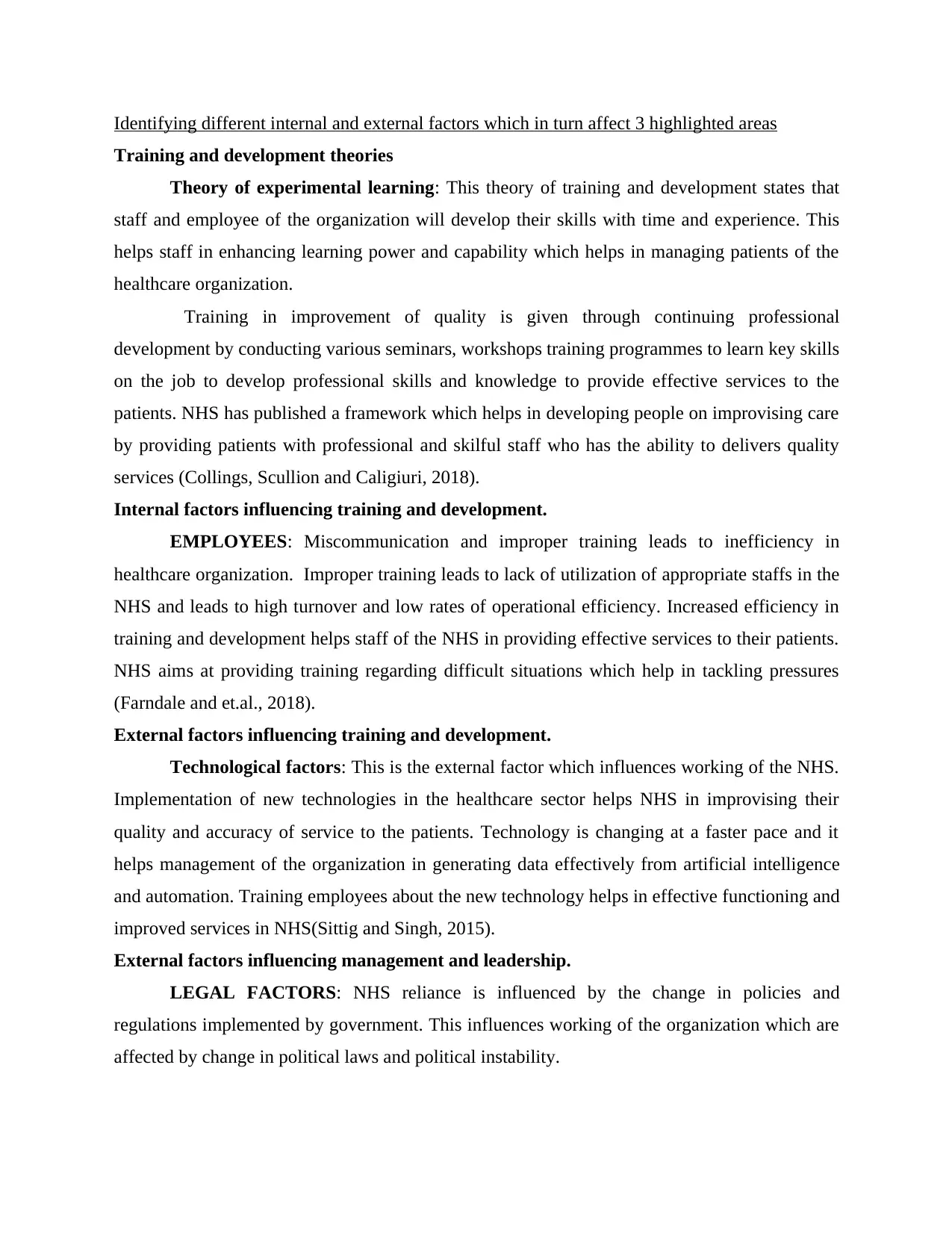
Identifying different internal and external factors which in turn affect 3 highlighted areas
Training and development theories
Theory of experimental learning: This theory of training and development states that
staff and employee of the organization will develop their skills with time and experience. This
helps staff in enhancing learning power and capability which helps in managing patients of the
healthcare organization.
Training in improvement of quality is given through continuing professional
development by conducting various seminars, workshops training programmes to learn key skills
on the job to develop professional skills and knowledge to provide effective services to the
patients. NHS has published a framework which helps in developing people on improvising care
by providing patients with professional and skilful staff who has the ability to delivers quality
services (Collings, Scullion and Caligiuri, 2018).
Internal factors influencing training and development.
EMPLOYEES: Miscommunication and improper training leads to inefficiency in
healthcare organization. Improper training leads to lack of utilization of appropriate staffs in the
NHS and leads to high turnover and low rates of operational efficiency. Increased efficiency in
training and development helps staff of the NHS in providing effective services to their patients.
NHS aims at providing training regarding difficult situations which help in tackling pressures
(Farndale and et.al., 2018).
External factors influencing training and development.
Technological factors: This is the external factor which influences working of the NHS.
Implementation of new technologies in the healthcare sector helps NHS in improvising their
quality and accuracy of service to the patients. Technology is changing at a faster pace and it
helps management of the organization in generating data effectively from artificial intelligence
and automation. Training employees about the new technology helps in effective functioning and
improved services in NHS(Sittig and Singh, 2015).
External factors influencing management and leadership.
LEGAL FACTORS: NHS reliance is influenced by the change in policies and
regulations implemented by government. This influences working of the organization which are
affected by change in political laws and political instability.
Training and development theories
Theory of experimental learning: This theory of training and development states that
staff and employee of the organization will develop their skills with time and experience. This
helps staff in enhancing learning power and capability which helps in managing patients of the
healthcare organization.
Training in improvement of quality is given through continuing professional
development by conducting various seminars, workshops training programmes to learn key skills
on the job to develop professional skills and knowledge to provide effective services to the
patients. NHS has published a framework which helps in developing people on improvising care
by providing patients with professional and skilful staff who has the ability to delivers quality
services (Collings, Scullion and Caligiuri, 2018).
Internal factors influencing training and development.
EMPLOYEES: Miscommunication and improper training leads to inefficiency in
healthcare organization. Improper training leads to lack of utilization of appropriate staffs in the
NHS and leads to high turnover and low rates of operational efficiency. Increased efficiency in
training and development helps staff of the NHS in providing effective services to their patients.
NHS aims at providing training regarding difficult situations which help in tackling pressures
(Farndale and et.al., 2018).
External factors influencing training and development.
Technological factors: This is the external factor which influences working of the NHS.
Implementation of new technologies in the healthcare sector helps NHS in improvising their
quality and accuracy of service to the patients. Technology is changing at a faster pace and it
helps management of the organization in generating data effectively from artificial intelligence
and automation. Training employees about the new technology helps in effective functioning and
improved services in NHS(Sittig and Singh, 2015).
External factors influencing management and leadership.
LEGAL FACTORS: NHS reliance is influenced by the change in policies and
regulations implemented by government. This influences working of the organization which are
affected by change in political laws and political instability.
Paraphrase This Document
Need a fresh take? Get an instant paraphrase of this document with our AI Paraphraser
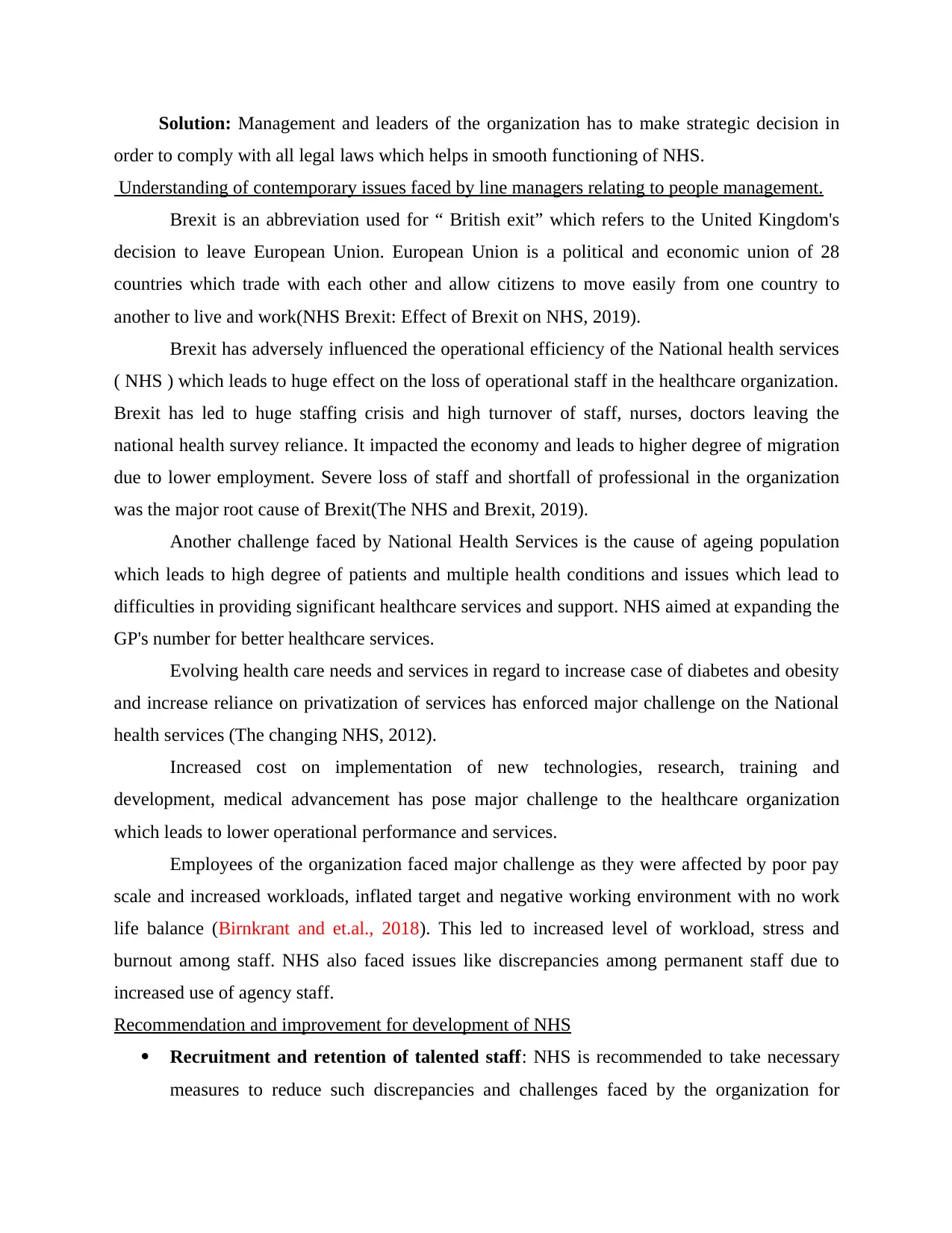
Solution: Management and leaders of the organization has to make strategic decision in
order to comply with all legal laws which helps in smooth functioning of NHS.
Understanding of contemporary issues faced by line managers relating to people management.
Brexit is an abbreviation used for “ British exit” which refers to the United Kingdom's
decision to leave European Union. European Union is a political and economic union of 28
countries which trade with each other and allow citizens to move easily from one country to
another to live and work(NHS Brexit: Effect of Brexit on NHS, 2019).
Brexit has adversely influenced the operational efficiency of the National health services
( NHS ) which leads to huge effect on the loss of operational staff in the healthcare organization.
Brexit has led to huge staffing crisis and high turnover of staff, nurses, doctors leaving the
national health survey reliance. It impacted the economy and leads to higher degree of migration
due to lower employment. Severe loss of staff and shortfall of professional in the organization
was the major root cause of Brexit(The NHS and Brexit, 2019).
Another challenge faced by National Health Services is the cause of ageing population
which leads to high degree of patients and multiple health conditions and issues which lead to
difficulties in providing significant healthcare services and support. NHS aimed at expanding the
GP's number for better healthcare services.
Evolving health care needs and services in regard to increase case of diabetes and obesity
and increase reliance on privatization of services has enforced major challenge on the National
health services (The changing NHS, 2012).
Increased cost on implementation of new technologies, research, training and
development, medical advancement has pose major challenge to the healthcare organization
which leads to lower operational performance and services.
Employees of the organization faced major challenge as they were affected by poor pay
scale and increased workloads, inflated target and negative working environment with no work
life balance (Birnkrant and et.al., 2018). This led to increased level of workload, stress and
burnout among staff. NHS also faced issues like discrepancies among permanent staff due to
increased use of agency staff.
Recommendation and improvement for development of NHS
Recruitment and retention of talented staff: NHS is recommended to take necessary
measures to reduce such discrepancies and challenges faced by the organization for
order to comply with all legal laws which helps in smooth functioning of NHS.
Understanding of contemporary issues faced by line managers relating to people management.
Brexit is an abbreviation used for “ British exit” which refers to the United Kingdom's
decision to leave European Union. European Union is a political and economic union of 28
countries which trade with each other and allow citizens to move easily from one country to
another to live and work(NHS Brexit: Effect of Brexit on NHS, 2019).
Brexit has adversely influenced the operational efficiency of the National health services
( NHS ) which leads to huge effect on the loss of operational staff in the healthcare organization.
Brexit has led to huge staffing crisis and high turnover of staff, nurses, doctors leaving the
national health survey reliance. It impacted the economy and leads to higher degree of migration
due to lower employment. Severe loss of staff and shortfall of professional in the organization
was the major root cause of Brexit(The NHS and Brexit, 2019).
Another challenge faced by National Health Services is the cause of ageing population
which leads to high degree of patients and multiple health conditions and issues which lead to
difficulties in providing significant healthcare services and support. NHS aimed at expanding the
GP's number for better healthcare services.
Evolving health care needs and services in regard to increase case of diabetes and obesity
and increase reliance on privatization of services has enforced major challenge on the National
health services (The changing NHS, 2012).
Increased cost on implementation of new technologies, research, training and
development, medical advancement has pose major challenge to the healthcare organization
which leads to lower operational performance and services.
Employees of the organization faced major challenge as they were affected by poor pay
scale and increased workloads, inflated target and negative working environment with no work
life balance (Birnkrant and et.al., 2018). This led to increased level of workload, stress and
burnout among staff. NHS also faced issues like discrepancies among permanent staff due to
increased use of agency staff.
Recommendation and improvement for development of NHS
Recruitment and retention of talented staff: NHS is recommended to take necessary
measures to reduce such discrepancies and challenges faced by the organization for
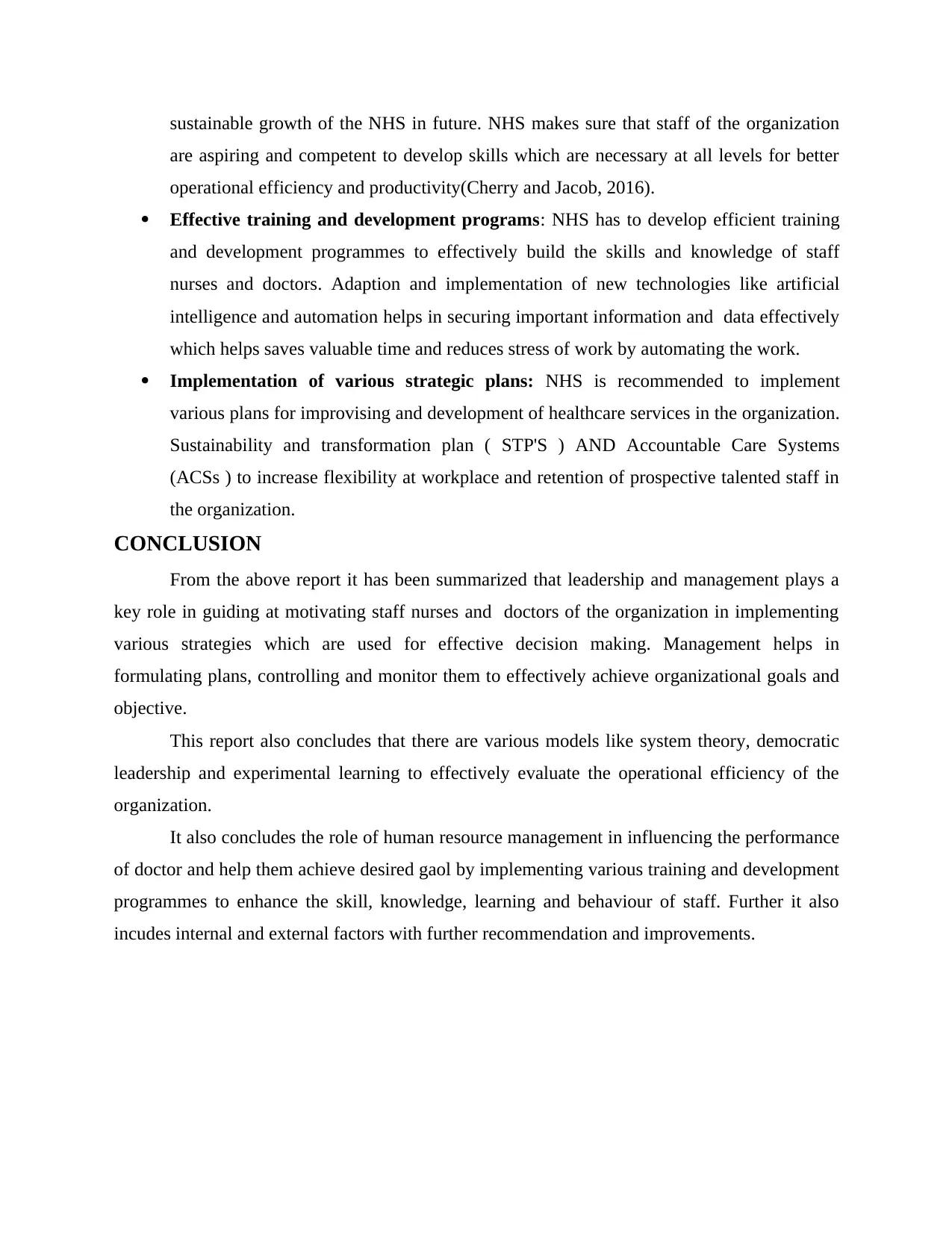
sustainable growth of the NHS in future. NHS makes sure that staff of the organization
are aspiring and competent to develop skills which are necessary at all levels for better
operational efficiency and productivity(Cherry and Jacob, 2016).
Effective training and development programs: NHS has to develop efficient training
and development programmes to effectively build the skills and knowledge of staff
nurses and doctors. Adaption and implementation of new technologies like artificial
intelligence and automation helps in securing important information and data effectively
which helps saves valuable time and reduces stress of work by automating the work.
Implementation of various strategic plans: NHS is recommended to implement
various plans for improvising and development of healthcare services in the organization.
Sustainability and transformation plan ( STP'S ) AND Accountable Care Systems
(ACSs ) to increase flexibility at workplace and retention of prospective talented staff in
the organization.
CONCLUSION
From the above report it has been summarized that leadership and management plays a
key role in guiding at motivating staff nurses and doctors of the organization in implementing
various strategies which are used for effective decision making. Management helps in
formulating plans, controlling and monitor them to effectively achieve organizational goals and
objective.
This report also concludes that there are various models like system theory, democratic
leadership and experimental learning to effectively evaluate the operational efficiency of the
organization.
It also concludes the role of human resource management in influencing the performance
of doctor and help them achieve desired gaol by implementing various training and development
programmes to enhance the skill, knowledge, learning and behaviour of staff. Further it also
incudes internal and external factors with further recommendation and improvements.
are aspiring and competent to develop skills which are necessary at all levels for better
operational efficiency and productivity(Cherry and Jacob, 2016).
Effective training and development programs: NHS has to develop efficient training
and development programmes to effectively build the skills and knowledge of staff
nurses and doctors. Adaption and implementation of new technologies like artificial
intelligence and automation helps in securing important information and data effectively
which helps saves valuable time and reduces stress of work by automating the work.
Implementation of various strategic plans: NHS is recommended to implement
various plans for improvising and development of healthcare services in the organization.
Sustainability and transformation plan ( STP'S ) AND Accountable Care Systems
(ACSs ) to increase flexibility at workplace and retention of prospective talented staff in
the organization.
CONCLUSION
From the above report it has been summarized that leadership and management plays a
key role in guiding at motivating staff nurses and doctors of the organization in implementing
various strategies which are used for effective decision making. Management helps in
formulating plans, controlling and monitor them to effectively achieve organizational goals and
objective.
This report also concludes that there are various models like system theory, democratic
leadership and experimental learning to effectively evaluate the operational efficiency of the
organization.
It also concludes the role of human resource management in influencing the performance
of doctor and help them achieve desired gaol by implementing various training and development
programmes to enhance the skill, knowledge, learning and behaviour of staff. Further it also
incudes internal and external factors with further recommendation and improvements.
⊘ This is a preview!⊘
Do you want full access?
Subscribe today to unlock all pages.

Trusted by 1+ million students worldwide
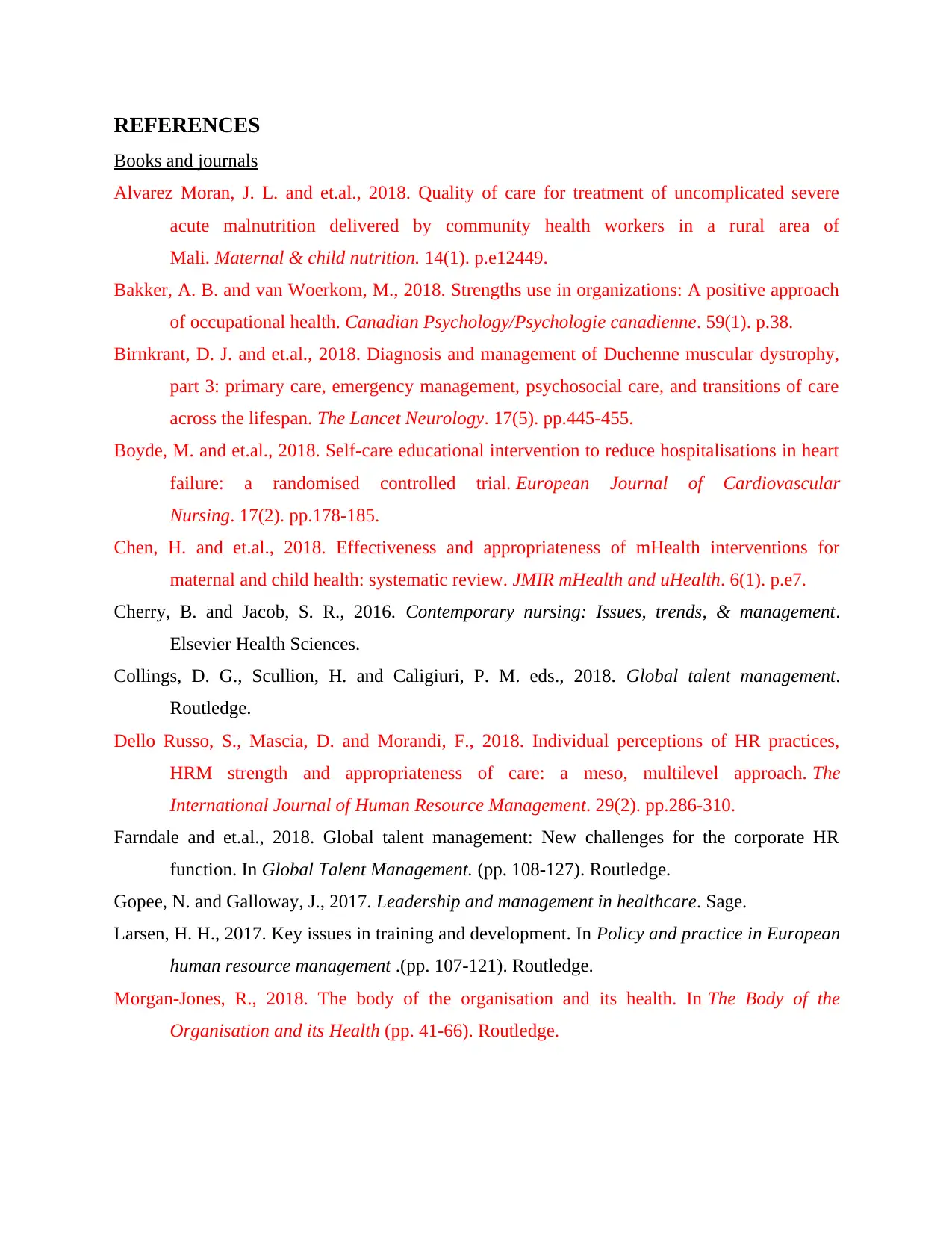
REFERENCES
Books and journals
Alvarez Moran, J. L. and et.al., 2018. Quality of care for treatment of uncomplicated severe
acute malnutrition delivered by community health workers in a rural area of
Mali. Maternal & child nutrition. 14(1). p.e12449.
Bakker, A. B. and van Woerkom, M., 2018. Strengths use in organizations: A positive approach
of occupational health. Canadian Psychology/Psychologie canadienne. 59(1). p.38.
Birnkrant, D. J. and et.al., 2018. Diagnosis and management of Duchenne muscular dystrophy,
part 3: primary care, emergency management, psychosocial care, and transitions of care
across the lifespan. The Lancet Neurology. 17(5). pp.445-455.
Boyde, M. and et.al., 2018. Self-care educational intervention to reduce hospitalisations in heart
failure: a randomised controlled trial. European Journal of Cardiovascular
Nursing. 17(2). pp.178-185.
Chen, H. and et.al., 2018. Effectiveness and appropriateness of mHealth interventions for
maternal and child health: systematic review. JMIR mHealth and uHealth. 6(1). p.e7.
Cherry, B. and Jacob, S. R., 2016. Contemporary nursing: Issues, trends, & management.
Elsevier Health Sciences.
Collings, D. G., Scullion, H. and Caligiuri, P. M. eds., 2018. Global talent management.
Routledge.
Dello Russo, S., Mascia, D. and Morandi, F., 2018. Individual perceptions of HR practices,
HRM strength and appropriateness of care: a meso, multilevel approach. The
International Journal of Human Resource Management. 29(2). pp.286-310.
Farndale and et.al., 2018. Global talent management: New challenges for the corporate HR
function. In Global Talent Management. (pp. 108-127). Routledge.
Gopee, N. and Galloway, J., 2017. Leadership and management in healthcare. Sage.
Larsen, H. H., 2017. Key issues in training and development. In Policy and practice in European
human resource management .(pp. 107-121). Routledge.
Morgan-Jones, R., 2018. The body of the organisation and its health. In The Body of the
Organisation and its Health (pp. 41-66). Routledge.
Books and journals
Alvarez Moran, J. L. and et.al., 2018. Quality of care for treatment of uncomplicated severe
acute malnutrition delivered by community health workers in a rural area of
Mali. Maternal & child nutrition. 14(1). p.e12449.
Bakker, A. B. and van Woerkom, M., 2018. Strengths use in organizations: A positive approach
of occupational health. Canadian Psychology/Psychologie canadienne. 59(1). p.38.
Birnkrant, D. J. and et.al., 2018. Diagnosis and management of Duchenne muscular dystrophy,
part 3: primary care, emergency management, psychosocial care, and transitions of care
across the lifespan. The Lancet Neurology. 17(5). pp.445-455.
Boyde, M. and et.al., 2018. Self-care educational intervention to reduce hospitalisations in heart
failure: a randomised controlled trial. European Journal of Cardiovascular
Nursing. 17(2). pp.178-185.
Chen, H. and et.al., 2018. Effectiveness and appropriateness of mHealth interventions for
maternal and child health: systematic review. JMIR mHealth and uHealth. 6(1). p.e7.
Cherry, B. and Jacob, S. R., 2016. Contemporary nursing: Issues, trends, & management.
Elsevier Health Sciences.
Collings, D. G., Scullion, H. and Caligiuri, P. M. eds., 2018. Global talent management.
Routledge.
Dello Russo, S., Mascia, D. and Morandi, F., 2018. Individual perceptions of HR practices,
HRM strength and appropriateness of care: a meso, multilevel approach. The
International Journal of Human Resource Management. 29(2). pp.286-310.
Farndale and et.al., 2018. Global talent management: New challenges for the corporate HR
function. In Global Talent Management. (pp. 108-127). Routledge.
Gopee, N. and Galloway, J., 2017. Leadership and management in healthcare. Sage.
Larsen, H. H., 2017. Key issues in training and development. In Policy and practice in European
human resource management .(pp. 107-121). Routledge.
Morgan-Jones, R., 2018. The body of the organisation and its health. In The Body of the
Organisation and its Health (pp. 41-66). Routledge.
Paraphrase This Document
Need a fresh take? Get an instant paraphrase of this document with our AI Paraphraser
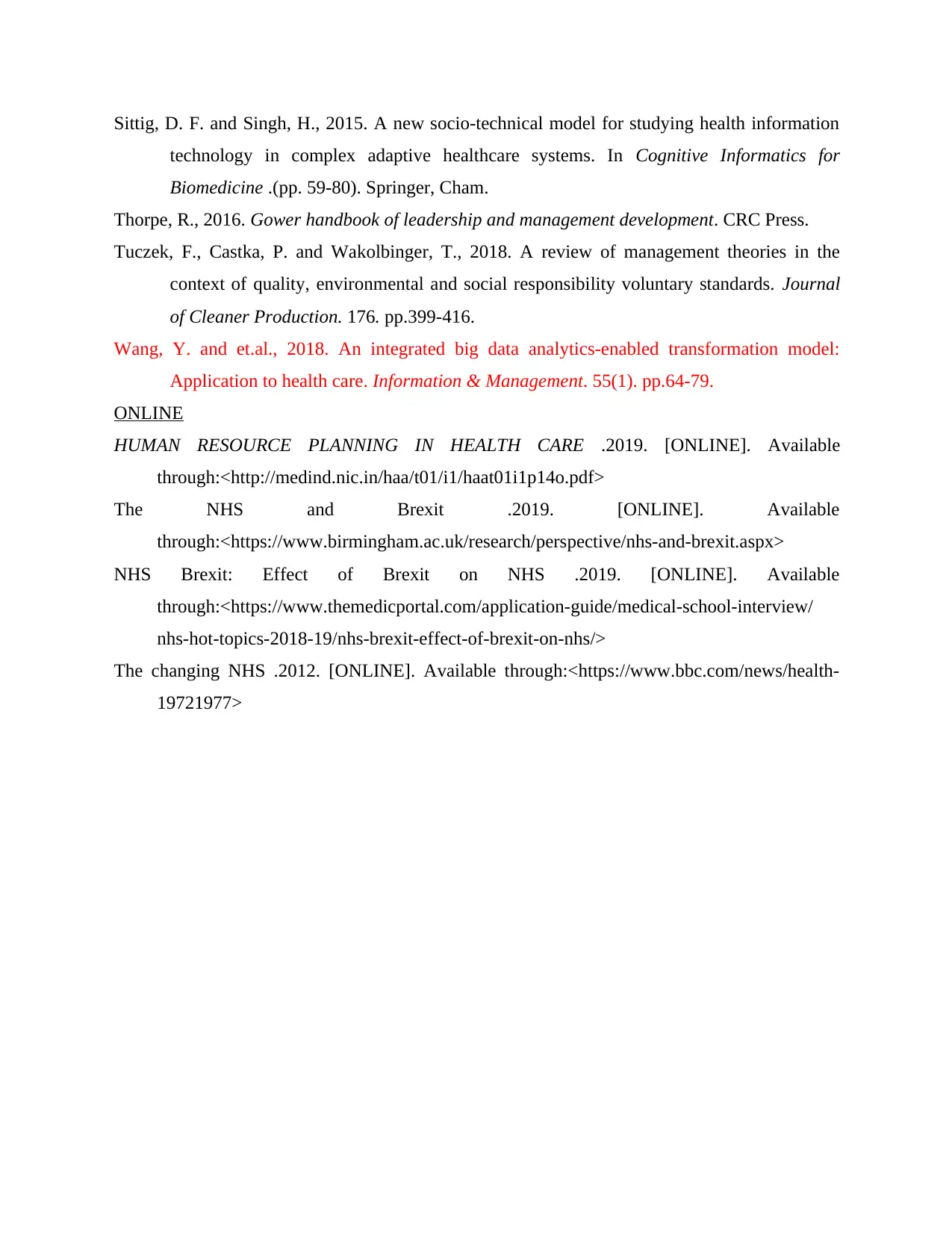
Sittig, D. F. and Singh, H., 2015. A new socio-technical model for studying health information
technology in complex adaptive healthcare systems. In Cognitive Informatics for
Biomedicine .(pp. 59-80). Springer, Cham.
Thorpe, R., 2016. Gower handbook of leadership and management development. CRC Press.
Tuczek, F., Castka, P. and Wakolbinger, T., 2018. A review of management theories in the
context of quality, environmental and social responsibility voluntary standards. Journal
of Cleaner Production. 176. pp.399-416.
Wang, Y. and et.al., 2018. An integrated big data analytics-enabled transformation model:
Application to health care. Information & Management. 55(1). pp.64-79.
ONLINE
HUMAN RESOURCE PLANNING IN HEALTH CARE .2019. [ONLINE]. Available
through:<http://medind.nic.in/haa/t01/i1/haat01i1p14o.pdf>
The NHS and Brexit .2019. [ONLINE]. Available
through:<https://www.birmingham.ac.uk/research/perspective/nhs-and-brexit.aspx>
NHS Brexit: Effect of Brexit on NHS .2019. [ONLINE]. Available
through:<https://www.themedicportal.com/application-guide/medical-school-interview/
nhs-hot-topics-2018-19/nhs-brexit-effect-of-brexit-on-nhs/>
The changing NHS .2012. [ONLINE]. Available through:<https://www.bbc.com/news/health-
19721977>
technology in complex adaptive healthcare systems. In Cognitive Informatics for
Biomedicine .(pp. 59-80). Springer, Cham.
Thorpe, R., 2016. Gower handbook of leadership and management development. CRC Press.
Tuczek, F., Castka, P. and Wakolbinger, T., 2018. A review of management theories in the
context of quality, environmental and social responsibility voluntary standards. Journal
of Cleaner Production. 176. pp.399-416.
Wang, Y. and et.al., 2018. An integrated big data analytics-enabled transformation model:
Application to health care. Information & Management. 55(1). pp.64-79.
ONLINE
HUMAN RESOURCE PLANNING IN HEALTH CARE .2019. [ONLINE]. Available
through:<http://medind.nic.in/haa/t01/i1/haat01i1p14o.pdf>
The NHS and Brexit .2019. [ONLINE]. Available
through:<https://www.birmingham.ac.uk/research/perspective/nhs-and-brexit.aspx>
NHS Brexit: Effect of Brexit on NHS .2019. [ONLINE]. Available
through:<https://www.themedicportal.com/application-guide/medical-school-interview/
nhs-hot-topics-2018-19/nhs-brexit-effect-of-brexit-on-nhs/>
The changing NHS .2012. [ONLINE]. Available through:<https://www.bbc.com/news/health-
19721977>
1 out of 11
Related Documents
Your All-in-One AI-Powered Toolkit for Academic Success.
+13062052269
info@desklib.com
Available 24*7 on WhatsApp / Email
![[object Object]](/_next/static/media/star-bottom.7253800d.svg)
Unlock your academic potential
Copyright © 2020–2026 A2Z Services. All Rights Reserved. Developed and managed by ZUCOL.




